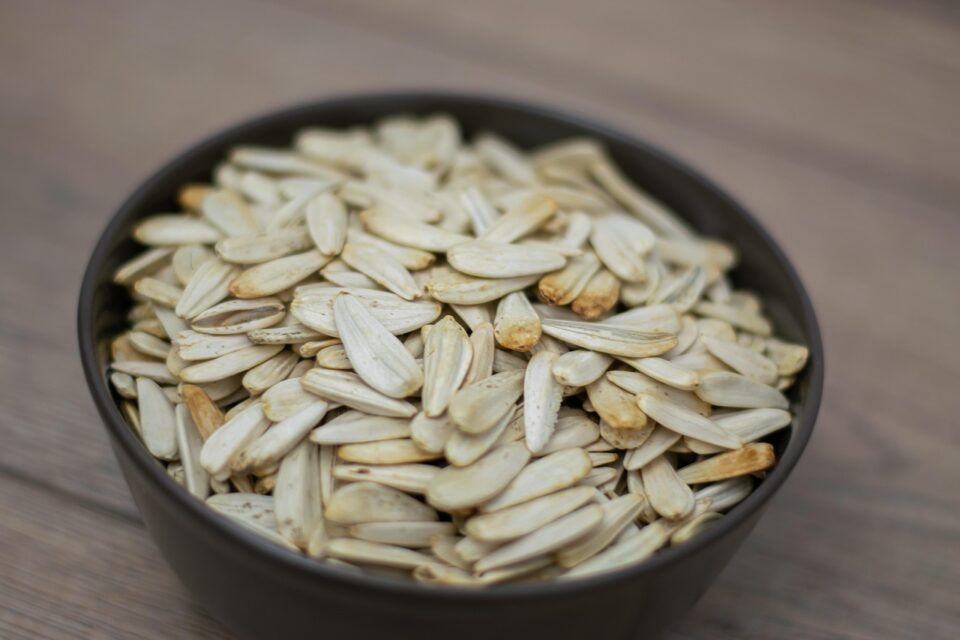Sunflower seeds aren’t just a fun snack — they’re full of powerful nutrients. These tiny seeds can support heart health, manage blood sugar, boost energy, and improve overall well-being. Adding a handful of sunflower seeds to your daily diet is an easy and healthy way to give your body the nutrition it needs.
1. Rich in Antioxidants That Protect Your Body
Sunflower seeds are packed with powerful antioxidants like vitamin E and selenium. These nutrients fight harmful free radicals in the body — unstable molecules that can damage your cells and increase the risk of problems like heart disease and cancer. Adding sunflower seeds to your diet can help protect your body, support immunity, and lower the risk of long-term illnesses.
2. Supports a Healthy Heart
Sunflower seeds are great for your heart and packed with nutrients that protect your cardiovascular health. Here’s how they help:
Good Fats: They’re full of healthy fats (polyunsaturated and monounsaturated) that help lower bad cholesterol (LDL) and raise good cholesterol (HDL), keeping your blood flowing smoothly and lowering your risk of heart attack and stroke.
High in Fiber: The fiber in sunflower seeds helps manage blood pressure and blocks bad cholesterol from being absorbed in your body.
Rich in Magnesium: This mineral helps relax your blood vessels, boosts circulation, and supports overall heart function.
Adding a small handful of sunflower seeds to your diet daily is a simple way to care for your heart.
3. Increases Energy Naturally
Stay Energized All Day with Sunflower Seeds
Keeping your energy up all day can be tough, but sunflower seeds make it easier. These tiny seeds are packed with complete protein that gives your body a steady supply of fuel. They’re also full of healthy fats that digest slowly, keeping you full and energized longer. Plus, they’re rich in vitamin B1 (thiamine), which helps your body turn food into energy more efficiently. Add a handful to your daily diet for a natural energy boost without the crash.
4. Natural Immunity Booster
Sunflower seeds are small but mighty for your immune health!
They’re packed with vitamin E, zinc, and selenium — key nutrients your body needs to stay strong and fight off illness. Vitamin E helps power up your body’s defense system, while zinc and selenium boost white blood cell production to fight infections fast.
Snack smart with sunflower seeds to keep your immunity strong, naturally.
They’re crunchy, tasty, and full of health-boosting goodness.
Add them to salads, smoothies, or enjoy by the handful!
5. Fights Inflammation Naturally
Chronic inflammation can lead to health issues like heart disease, arthritis, and even cancer. Sunflower seeds may help lower inflammation because they’re rich in choline, a nutrient known for its calming effect on the body’s inflammatory response. Plus, their healthy fats also support reducing swelling and pain naturally.
6. Helps Keep Blood Sugar Levels Steady
Sunflower seeds are a smart snack for managing blood sugar. Their high fiber slows down carb absorption, helping keep sugar levels stable. Plus, the healthy fats and protein in sunflower seeds keep you full longer, reducing the chance of blood sugar spikes from overeating — making them a great choice for people with diabetes or anyone looking to keep their blood sugar levels in check naturally.
7. Supports Muscle Growth and Faster Recovery
Sunflower seeds are a great snack for athletes and fitness lovers. They’re packed with complete protein, meaning they have all 9 essential amino acids your body needs to build and repair muscles. The mix of protein and healthy fats in sunflower seeds gives long-lasting energy during workouts and helps muscles recover faster afterward.
8. Supports Stronger Bones
Sunflower Seeds for Stronger Bones: A Tasty Way to Boost Bone Health
As we grow older, keeping our bones strong becomes more important — especially to avoid conditions like osteoporosis, which makes bones weak and more likely to break. The good news? Adding sunflower seeds to your daily diet is an easy and tasty way to support better bone health naturally.
Sunflower seeds are packed with key nutrients your bones need:
- Phosphorus works hand-in-hand with calcium to build strong, sturdy bones.
- Magnesium helps your body absorb calcium properly — without it, calcium can’t do its job.
- Manganese supports collagen production, which keeps bones flexible and strong from the inside out.
- Vitamin K helps calcium stick to your bones by activating special proteins needed for bone strength.
With just a handful of sunflower seeds a day, you can give your body the nutrients it needs to protect your bones and lower your risk of fractures as you age.
9. Supports Better Digestion Naturally
Sunflower seeds are a great source of dietary fiber, which plays a key role in keeping your digestive system running smoothly. Fiber adds bulk to your stool, helps prevent constipation, and supports regular bowel movements.
Plus, sunflower seeds contain healthy fats that support gut health and help your body absorb fat-soluble vitamins better. Adding a small serving of sunflower seeds to your daily diet can help improve digestion, keep your gut healthy, and make you feel lighter and more energized.
10. Glowing Skin Benefits from Sunflower Seeds
Sunflower seeds are rich in skin-loving nutrients that help keep your skin healthy, clear, and glowing. They’re loaded with vitamin E, a powerful antioxidant that protects your skin from damage caused by sun exposure and pollution.
These seeds also contain zinc and essential fatty acids that support skin repair, fight acne, and keep your skin hydrated and soft. Including sunflower seeds in your diet can naturally boost your skin’s glow and slow down signs of aging.
FAQ’s
1. What are the health benefits of sunflower seeds?
Sunflower seeds are rich in protein, fiber, healthy fats, antioxidants, vitamins, and minerals that support heart health, boost energy, improve skin, and aid digestion.
2. Are sunflower seeds good for weight loss?
Yes, sunflower seeds can help with weight loss when eaten in moderation. Their high fiber and protein content keeps you full longer and reduces cravings.
3. How many sunflower seeds can I eat in a day?
Eat about 1 ounce (¼ cup) a day. That’s enough to get the benefits without too many calories.
4. Are sunflower seeds good for your skin?
Yes! Sunflower seeds are packed with vitamin E, zinc, and healthy fats that nourish the skin, reduce acne, and fight signs of aging.
5. Can sunflower seeds help lower cholesterol?
Absolutely! Sunflower seeds contain healthy fats and fiber that can lower bad (LDL) cholesterol and support better heart health.
6. Can sunflower seeds cause allergies?
Some people may be allergic. If you feel itchy or sick after eating them, stop and see a doctor.
7. Is it okay to eat sunflower seeds every day?
Yes, you can eat them daily, but stick to the right amount and avoid salted or sugar-coated ones.
8. Can sunflower seeds make your bones stronger?
Yes! They have magnesium and phosphorus, which help keep your bones strong and healthy.
9. Are sunflower seeds good for people with diabetes?
Yes. They help control blood sugar by slowing how fast sugar enters the blood. They’re a smart snack for diabetics.
10. Do sunflower seeds help with building muscles?
Yes. They have protein that helps your body grow and repair muscles, especially after exercise.

